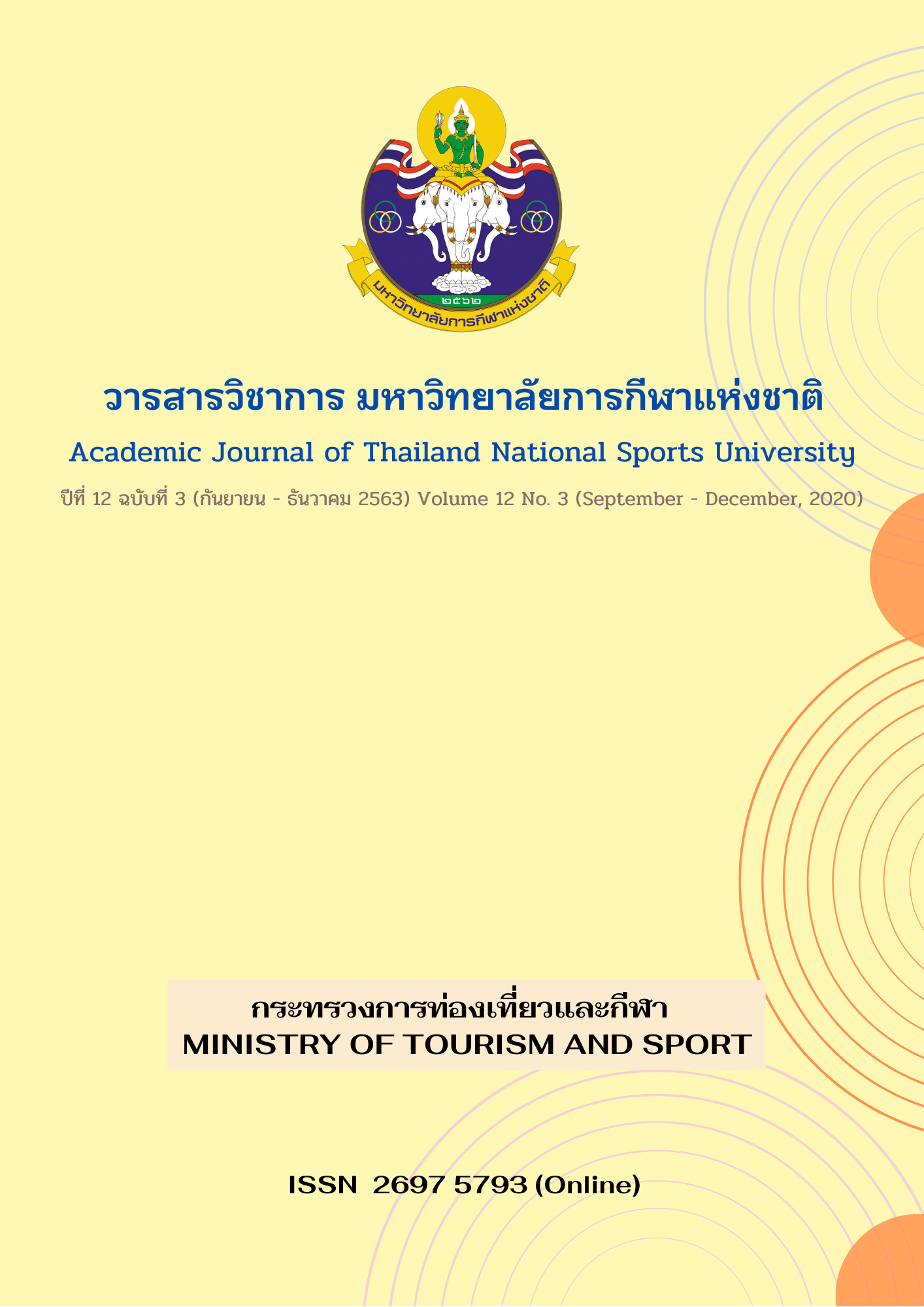FACTORS AFFECTING ORGANIZATIONAL LOYALTY OF REFEREES IN THAILAND VOLLEYBALL ASSOCIATION
Main Article Content
Abstract
The purposes of this research were to 1) study the organizational loyalty of the referees in the Volleyball Association of Thailand, 2) study the factors affecting the organizational loyalty of the referees in the Volleyball Association of Thailand, and 3) propose guidelines to the administrators for the ways to strengthen the organizational commitment of employees. The sample group consisted of 200 volleyball judges registered with the Volleyball Association of Thailand, which were obtained by a convenience sampling method. The questionnaire was used as a research instrument for data collection. The data were analyzed by percentage, mean, standard deviation and multiple regression analysis.
The result revealed that most of the samples were 40-50 years old, with more-than- 15-year working experience with the Volleyball Association of Thailand and more-than- 15-year working experience as a volleyball referee. They agreed most with job enrichment, their job satisfaction was found at a highest level and their opinions towards organizational loyalty was found at a highest level. The results of multiple regression analysis showed that the job satisfaction variable had the highest level of loyalty to the organization (Beta = 0.438) followed by job enhancement (Beta = 0.388) and age. (Beta = 0.144) and all three variables can predict the loyalty to the organization at 60.0 percent with the statistical significance level of .05.
Article Details
The published article is a copyright of the Academic Journal of Thailand National Sports University. The passage appeared in each article in this academic journal is a perspective of each author which is not related to the journal. Each author is required to be responsible for all components of his/her own article. If there are any mistakes, each author must be responsible for those mistakes on his/her own.
References
Damrong Phetploynin. (2009). Female vollyeball team management in 37th Sport Authority of Thailand. (Master’s thesis). Naresuan University.
Dwyer, D.J., and Fox, M.L. (2000). The moderating role of hostility in the relationship between enriched jobs and health. Academy of Management Journal, 43(6), 1086–1096.
Eisinga R, Te Grotenhuis M, Pelzer B. (2012). The reliability of a two-item scale: Pearson, Cronbach or Spearman-Brown?. International Journal of Public Health, 58(4), 637-642.
Luthans, Fred. (2008). Organizational Behavior. (11th ed.). Boston: Irwin Mc.Graw – Hill.
May, D.R., Gilson, R.L., & Harter, L.M. (2004). The psychological conditions of meaningfulness, safety, andavailability and the engagement of the human spirit at work. Journal of Occupational Psychology, 77(1), 11-37.
Niehoff, B.P., Moorman, R.H., Blakely, G.L., and Fuller, J. (2001). The influence of empowerment and job enrichment on employee loyalty in a downsizing environment. Group & Organization Management, 26(1), 93 – 113.
Pichit Khutruang. (2007). Employees’ satisfaction and organizational loyalty affecting working behavior of Supreme Precision Manufacturing Co., Ltd. (Master’s thesis). Srinakharinwirot University.
Prasart Nophunt. (2005). A construction of rating scales for the football referee. (Master’s thesis). Khon Kaen University.
Robbins, Stephen P., & Jude,Timothy A. (2015). Organizational behavior. (16th ed.). Harlow: Pearson Education Limited.
Ronna CT, Laurie C. (2003). Indexes of item-objective congruence for multidimensional items. International Journal of Testing, 3(2), 163-171.
Thailand Volleyball Association. (2012). Thailand Volleyball Association of Strategic Plan Bangkok. Thailand Volleyball Association.
Tunitipha Kaewsang. (2015). The relationships between organizational commitment and organizational loyalty of the staffs Nongpho Ratchaburi Dary Cooperative Limited (Under The Royal Patronage). (Master’s thesis). Silapakorn University.
Vinod Hatwal & Chaubey, D.S. (2014). Factor Influencing employees loyality towards organization: an empirical investigation at educational institutions in Dehradun. Ge-International Journal of Management Research, 2(11), 185-203.


